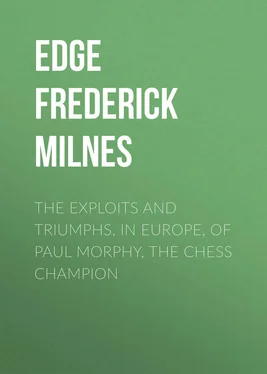Frederick Edge - The Exploits and Triumphs, in Europe, of Paul Morphy, the Chess Champion
Здесь есть возможность читать онлайн «Frederick Edge - The Exploits and Triumphs, in Europe, of Paul Morphy, the Chess Champion» — ознакомительный отрывок электронной книги совершенно бесплатно, а после прочтения отрывка купить полную версию. В некоторых случаях можно слушать аудио, скачать через торрент в формате fb2 и присутствует краткое содержание. Жанр: Развлечения, foreign_antique, foreign_prose, на английском языке. Описание произведения, (предисловие) а так же отзывы посетителей доступны на портале библиотеки ЛибКат.
- Название:The Exploits and Triumphs, in Europe, of Paul Morphy, the Chess Champion
- Автор:
- Жанр:
- Год:неизвестен
- ISBN:нет данных
- Рейтинг книги:4 / 5. Голосов: 1
-
Избранное:Добавить в избранное
- Отзывы:
-
Ваша оценка:
- 80
- 1
- 2
- 3
- 4
- 5
The Exploits and Triumphs, in Europe, of Paul Morphy, the Chess Champion: краткое содержание, описание и аннотация
Предлагаем к чтению аннотацию, описание, краткое содержание или предисловие (зависит от того, что написал сам автор книги «The Exploits and Triumphs, in Europe, of Paul Morphy, the Chess Champion»). Если вы не нашли необходимую информацию о книге — напишите в комментариях, мы постараемся отыскать её.
The Exploits and Triumphs, in Europe, of Paul Morphy, the Chess Champion — читать онлайн ознакомительный отрывок
Ниже представлен текст книги, разбитый по страницам. Система сохранения места последней прочитанной страницы, позволяет с удобством читать онлайн бесплатно книгу «The Exploits and Triumphs, in Europe, of Paul Morphy, the Chess Champion», без необходимости каждый раз заново искать на чём Вы остановились. Поставьте закладку, и сможете в любой момент перейти на страницу, на которой закончили чтение.
Интервал:
Закладка:
We were much afraid, nevertheless, that Mr. Morphy would be unable to quit his legal studies for the purpose of attending the Congress, but when Mr. Fiske announced the receipt of a telegraphic despatch, which stated that he was en route , everybody hailed the news with satisfaction. Mr. Paulsen now came to the support of Judge Meek, and declared that Paul Morphy would carry off the first prize in the tournament; giving, as the grounds of his opinion, some two or three published games of the young Louisianian, which he considered worthy to rank with the finest master-pieces of chess strategy. Benignant fate brought the young hero safely to New York, some two days before the assembling of the Congress.
Who that was present that evening does not remember Paul Morphy's first appearance at the New York Chess Club? The secretary, Mr. Frederick Perrin, valorously offered to be his first antagonist, and presented about the same resistance as a musquito to an avalanche. Then who should enter the room but the warrior Stanley, tomahawk in one hand and the scalps of Schulten and Rousseau in the other. Loud cries were made for "Stanley! Stanley!" and Mr. Perrin resigned his seat to the new comer, in deference to so general a request. Thus commenced a contest, or rather a succession of contests, in which Mr. Stanley was indeed astonished. "Mate" followed upon "mate," until he arose from his chair in bewildered defeat.
The following day, the assembled delegates and amateurs from the various clubs, organized the Congress by the election of a president, in the person of Judge Meek, with Mr. Fiske as secretary, four assistant secretaries, marshals, treasurer, etc. All these matters of detail, as well as the games played, the laws passed, etc., etc., will eventually appear in the long looked for "Book of the Congress," forthcoming with the completion of the "British Museum Catalogue."
In the absence of the "Book of the Congress," I must give a slight sketch of its proceedings, in order to trace the career of Paul Morphy ab initio . After taking possession of the magnificent hall which the New York Committee of Management had chosen for the meeting, the sixteen contestants in the Grand Tournament, proceeded to pair themselves off by lot. Never was fate more propitious than on this occasion in coupling the antagonists. It is obvious, that however apparently equal in strength two opponents may be, one will prove stronger than the other. This is an axiom requiring no proof. Out of sixteen, one is better than the rest, and one out of the remaining fifteen is stronger than the fourteen others. The latter player may be drawn in the first round of the tournay with the former, and though he stand incomparably the superior of all but one, he loses every chance of a prize by being put immediately hors du combat .
Amongst the sixteen players who entered the lists, two were unmistakably the strongest, namely, Messrs. Morphy and Paulsen; and much fear was manifested lest they might be drawn together, in the first round. Such, however, was not the case. Mr. Paulsen was coupled with Mr. Dennis Julien, the well-known problem maker, and a gentleman whose hospitality to chess players scarcely requires praise from me. Mr. Julien had allowed his name to be entered in the Grand Tournament in the absence of the representative of Connecticut, Mr. S. R. Calthrop, but the latter player arriving shortly after, Mr. Julien was but too happy to resign in his favor. Mr. Morphy's antagonist was Mr. James Thompson, of New York, a gentleman who finished his chess education at the Café de la Régence, and the London Chess Divan, noted for the brilliancy and daring of his attack, and his pertinacity in playing the Evans' Gambit wherever he has a chance. If Mr. Thompson had not been pitted against such a terrible opponent, in the first round, he would have tested the powers of some of the other players.
Mr. Morphy's second opponent was Judge Meek. As they took their seats opposite each other, one thought of David and Goliath; not that the Judge gasconaded in any wise after the fashion of the tall Philistine, for modesty adorns all his actions; but there was as much difference in cubic contents between the two antagonists, as between the son of Jesse and the bully of Gath, and in both cases the little one came out biggest. Judge Meek sat down with an evident conviction of the result, and although he assured his youthful opponent, that if he continued mating him without ever allowing him the least chance, he would put him in his pocket, he consoled himself with the reflection that Paul Morphy would serve everybody else as he served him.
Hitherto our hero had won every game. In the third round he encountered the strongest player of the New York Club, Mr. Theodore Lichtenhein, a gentleman who had formerly been President of the Circle des Echecs at Königsburg in Prussia, and an admirable exponent of the Berlin school of play. Mr. Lichtenhein eventually carried off the third prize in the tournament, and although he did not win any game from Mr. Morphy, he succeeded in effecting "a draw," which, against such a terrible enemy, is almost worthy of being esteemed a victory.
Mr. Paulsen had also been successful in the first and second rounds without losing or drawing a single game, and, as if to keep even with his great rival, he, too, had made "a draw" in the third section of the tournament – with Dr. Raphael, of Kentucky. Now was to be decided the championship of the New World, and notwithstanding that the majority anticipated the result, yet many of the spectators thought that the Western knight might prove a hard nut for Morphy to crack. Mr. Paulsen's game is steady and analytical to a nicety. Modelling his operations on profound acquaintance with Philidor, he makes as much out of his Pawns as most others of their Pieces. In reply to Mons. de Rivière, I once heard Morphy say, "Mr. Paulsen never makes an oversight; I sometimes do."
It is only justice to Mr. Paulsen to state, that he never for one moment imagined that he would beat Mr. Morphy. So exalted was his appreciation of the latter's wondrous powers of combination, that he has been frequently heard to declare – "If Anderssen and Staunton were here, they would stand no chance with Paul Morphy; and he would beat Philidor and Labourdonnais too, if they were alive." And when, after the termination of the Congress, Mr. Morphy offered Pawn and Move to all and every player in America, Mr. Paulsen declared that he could easily give those odds to him. But this invariable confession of inferiority did not at all interfere with his doing the utmost to become victor, although supremacy was only to be decided by one player scoring five games. If I recollect rightly, it was in the third game that Mr. Morphy committed an error, which spoiled one of the finest combinations ever seen on a chess-board. This combination consisted of some eighteen or twenty moves, and its starting point was one of those daring sacrifices which European players dignify with the title "à la Morphy." Certain of the inevitable result, ( humanum est erraret almost loses its signification when applied to his combinations,) our hero played rapidly, and misplaced a move. The result was, loss of attack and a piece, and apparently of the game; the most ardent admirer of Paul Morphy believed it was impossible for him to avoid defeat. But though angry with himself for his carelessness, he was not disheartened, but set to work with courage, and effected "a draw." The latter part of this game is a masterpiece of perseverance and strategy. The result of the tournament is well known. Mr. Morphy won five games, drew one, and lost one in the concluding section – only one battle lost during the entire campaign. The annals of chess do not furnish a similar victory.
CHAPTER III
MORPHY PREPARES TO START FOR EUROPE
Интервал:
Закладка:
Похожие книги на «The Exploits and Triumphs, in Europe, of Paul Morphy, the Chess Champion»
Представляем Вашему вниманию похожие книги на «The Exploits and Triumphs, in Europe, of Paul Morphy, the Chess Champion» списком для выбора. Мы отобрали схожую по названию и смыслу литературу в надежде предоставить читателям больше вариантов отыскать новые, интересные, ещё непрочитанные произведения.
Обсуждение, отзывы о книге «The Exploits and Triumphs, in Europe, of Paul Morphy, the Chess Champion» и просто собственные мнения читателей. Оставьте ваши комментарии, напишите, что Вы думаете о произведении, его смысле или главных героях. Укажите что конкретно понравилось, а что нет, и почему Вы так считаете.












